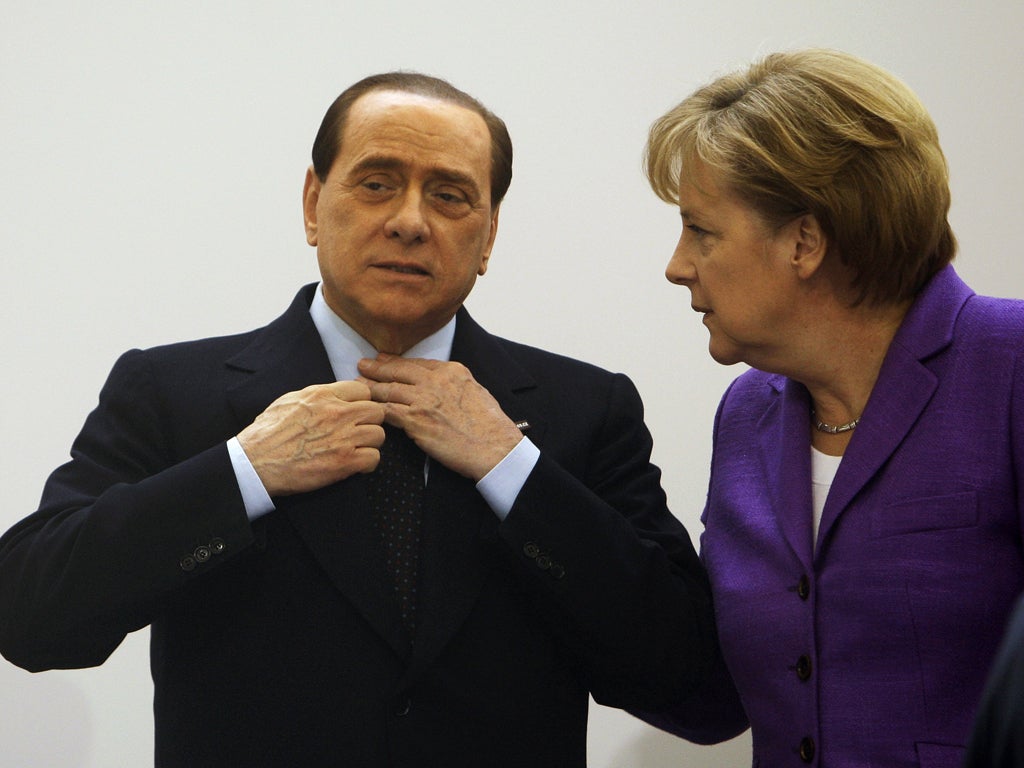Merkel under fire over phone bid to oust Berlusconi

Your support helps us to tell the story
From reproductive rights to climate change to Big Tech, The Independent is on the ground when the story is developing. Whether it's investigating the financials of Elon Musk's pro-Trump PAC or producing our latest documentary, 'The A Word', which shines a light on the American women fighting for reproductive rights, we know how important it is to parse out the facts from the messaging.
At such a critical moment in US history, we need reporters on the ground. Your donation allows us to keep sending journalists to speak to both sides of the story.
The Independent is trusted by Americans across the entire political spectrum. And unlike many other quality news outlets, we choose not to lock Americans out of our reporting and analysis with paywalls. We believe quality journalism should be available to everyone, paid for by those who can afford it.
Your support makes all the difference.The German chancellor Angela Merkel pressed for the removal of the former premier Silvio Berlusconi “in order to save the Euro”, according to a report that has caused a political storm in Italy.
Resentment was already been building among Italy’s mainstream political parties at having to kowtow to an unelected, technocrat government charged with forcing tough austerity measures through parliament. But claims in a US newspaper that Ms Merkel phoned Italy’s supposedly neutral head of state, President Giorgio Napolitano, in order to speed up Mr Berlusconi’s departure, will fuel suspicion of a Franco-German putsch. It will also enrage members of the medial mogul’s People of Freedom (PDL) party.
Yesterday’s Wall Street Journal suggested that Ms Merkel had “intervened” on 20 October and telephoned Mr Napolitano in Rome, urging him to “nudge Berlusconi off the stage”. Germany, it said, was alarmed by the Berlusconi government’s inability to fight the debt crisis and introduce the reforms demanded by the European Central Bank.
Ms Merkel called on Mr Napolitano to do what was “within your powers”. The report adds that within days the president “quietly began sounding out Italy's political parties to test the support for a new government if Mr Berlusconi couldn't satisfy Europe and the markets”.
It could be argued that such activities were in line with the president’s job description, and that he might have taken such a course anyway, given the economic crisis and the weakness of the Berlusconi administration.
But the WSJ said its claims, which were based on interviews with more than two dozen policy makers – none of whom is named – as well as key documents, reveal “how Germany responded to the dangers in Italy by imposing its power on a divided euro zone”.
Daniele Capezzone, a PDL spokesman, said the phone call appeared “authoritative and invasive”. Another PDL MP, Melania de Nichilo Rizzoli, said: “We are not a German colony. The European treaties do not allow the interference of one state in the political affairs of another European state.”
A statement released by Napolitano's office did not deny that the call took place. But it said there was no discussion ”of any issue of internal Italian politics, nor any request to replace the premier“. ”The reason for the conversation was only about the measures taken and to be taken to reduce the deficit, in defence of the euro and in relation to structural reforms,“ it said.
However, suspicions that Mr Napolitano was keen to speed Mr Berlusconi’s departure may have been heightened by comments made in the week before Christmas — virtually unprecedented for an Italian head of state — in which he said the media mogul’s administration had become internationally “untenable”.
Mr Berlusconi lost his parliamentary majority on 8 November. That evening he announced his would resign as soon as an emergency-budget had been passed. Later that week, as doubts mounted regarding Mr Berlusconi’s intention to step down, the president made an unusually forceful declaration saying that the 75-year-old tycoon was indeed about to quit, leaving him with no choice but to go within days.
Mr Napolitano, with broad support in parliament, then named the respected economist Mario Monti as Italy's new premier. However, yesterday’s claims will do little to help Mr Monti, as resistance starts to build to the tough reforms and cuts he must pass in order to turn around Italy’s finances.
Join our commenting forum
Join thought-provoking conversations, follow other Independent readers and see their replies
Comments